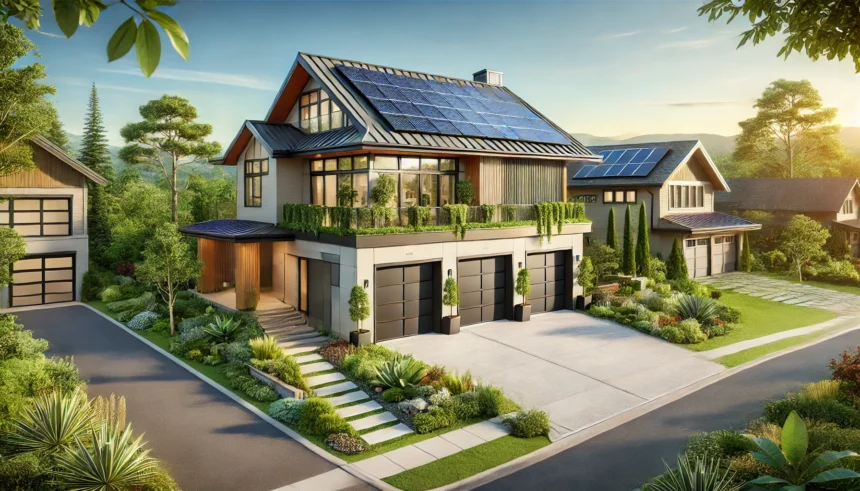Introduction to Smart and Sustainable Homes
The concept of a smart and sustainable home is increasingly influencing modern residential architecture. This approach integrates advanced technology with eco-friendly practices to create living spaces that are efficient and kind to the environment. The adoption of smart technology in homes has become more mainstream due to its numerous benefits, including improved energy efficiency and enhanced convenience. An integral part of this transition is the revolution in residential garage doors features, which have become more sophisticated and environmentally conscious.
Components such as garage doors offer increased functionality and reduced energy consumption by integrating smart technology. These advancements enable homeowners to contribute positively to environmental conservation while improving the convenience and security of their homes. This article explores how modern garage doors create a smarter, more sustainable lifestyle.
Features of Smart Garage Doors
The features of smart garage doors are varied and designed to offer optimal convenience and enhanced control to the homeowner. Popular features include remote access, allowing users to open or close their doors using a smartphone app from virtually anywhere in the world. Like garage doors, smart gate control systems use technology to enable remote access and monitoring of your gates. Doors can also be programmed to open or close at specific times or respond to certain conditions. This level of automation simplifies daily life and offers significant energy savings by reducing the workload on heating and cooling systems due to better insulation. Furthermore, smart garage doors contribute to the increased resale value of homes, as they are viewed as a desirable feature by potential buyers.
The Role of Modern Garage Doors
Modern garage doors have transcended their traditional role of merely serving as an entry and exit point. They have become pivotal in enhancing homes‘ overall energy efficiency and security framework. Innovations have led to doors with improved insulation, minimizing heat loss in winter and maintaining more astonishing interiors in summer—this efficiency results in decreased energy costs and a smaller carbon footprint. For instance, incorporating solar panels into garage structures powers the door’s operation and generates energy for other home parts. Such features demonstrate the commitment of modern design to environmental sustainability.
Energy Efficiency and Environmental Impact
Energy efficiency is a cornerstone of modern garage door design, leveraging various technologies to make homes more sustainable. Improved insulation is a significant feature of energy-efficient garage doors. By preventing drafts and maintaining a consistent internal temperature, these doors significantly reduce energy bills while providing comfort. Additionally, many contemporary garage doors are constructed from recycled or sustainably sourced materials, which lessens the environmental impact of production. The overall effect translates to a smaller carbon footprint and supports global efforts towards ecological conservation.
Tips for Selecting the Right Garage Door
Choosing the appropriate garage door involves evaluating material, style, and energy rating. Materials like steel, wood, and composites present different benefits ranging from durability to aesthetic appeal. It’s essential to select a door that complements the architecture of your home and meets your functional requirements. Energy ratings are also important, as doors with higher insulation can lead to significant energy savings. Moreover, warranties and after-purchase service plans should not be overlooked, as they ensure the longevity and performance of the garage door.
Home Security and Smart Garage Doors
Security is a crucial aspect of modern home designs, and smart garage doors play a pivotal role in enhancing it. Equipped with features such as real-time alerts, integrated surveillance cameras, and encrypted locking mechanisms, these doors greatly deter unlawful entry attempts. They provide homeowners with peace of mind, knowing that these sophisticated security measures protect their families and belongings. The added layer of security that smart garage doors offer makes them an invaluable addition to any modern home security system.
Real-life Examples of Smart Garage Integrations
Take, for instance, the Nelson family’s experience, which transformed their garage by installing a smart door system. The technology provided them with remote accessibility, streamlining their daily routines and offering insights into their energy usage. This smart integration also introduced solutions to long-standing issues of poor insulation and unreliable access. Beyond functionality, it significantly augmented their home’s energy efficiency, reducing their utility bills. Real-life examples like this emphasize the tangible benefits of integrating smart features in garages.
Future Trends in Smart Home Design
The future looks bright for smart home technologies, with anticipated advancements featuring broader automation, AI enhancements, and eco-friendly innovations. The next generation of garage doors may include cutting-edge solar technology and sustainable resources, further aligning with global environmental initiatives. The combination of technology and sustainability promises to yield intelligent and substantially beneficial homes for the planet. These innovations are set to redefine the standard of modern living spaces.
Conclusion
Immersing smart technology into elements like garage doors is a testament to home design’s evolving nature. Integrating these features offers convenience, security, and environmental benefits, establishing a more sustainable household framework. As we progress into a future prosperous with technological possibilities, homeowners are urged to embrace these advancements to bolster the efficiency and sustainability of their living environments.








